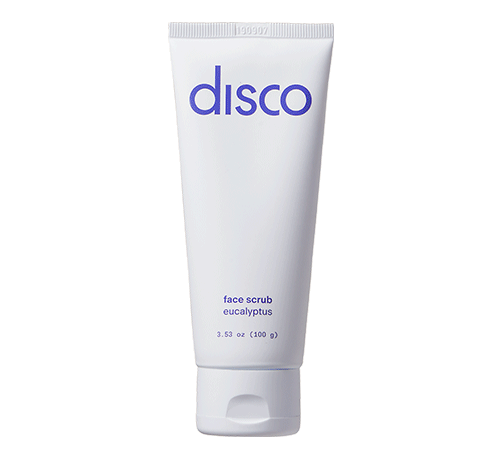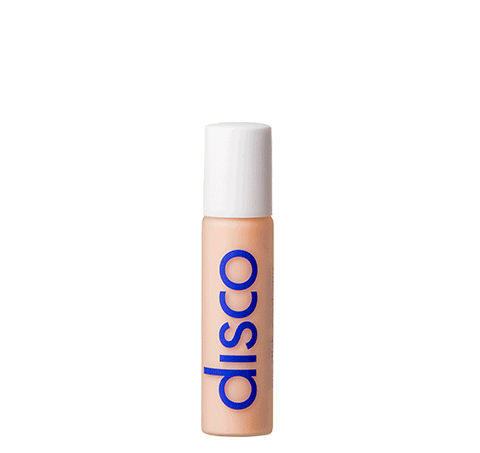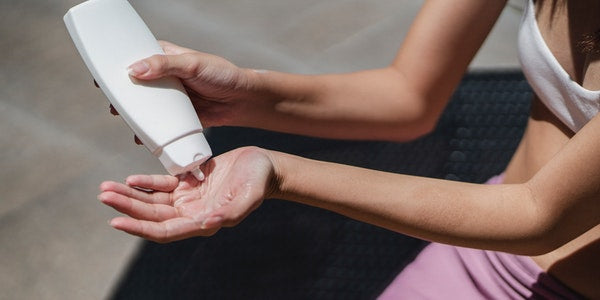We’re deep in summer now, and if you’re planning a weekend on the lake or spending a few days at the beach, you’ve probably already loaded up on sunscreen. Chances are, you toss that bottle of sun protectant into the back of your bathroom cabinet as soon as you get home from your trip, and man, that’s a mistake.
You need sunscreen even on days when you aren’t spending a lot of time outdoors. In fact, you can even get harmful UV exposure when commuting to work in your car or telecommuting by a window in your home.
If the sun’s out (or even behind some clouds), you need sunscreen. But the type of sunscreen you use matters. We talked to our chief science officer (who is also a dermatologist) to get the info you need about sunscreen, the difference between chemical and mineral formulas, and which she recommends as better for your skin.
Do You Really Need Sunscreen?
If you’ve asked yourself this question, it’s time to catch up with the 21st century. Yes, you absolutely need sunscreen, and for more reasons than you might think.
The sun gives off three different types of damaging rays: UVA, UVB, and UVC.
UVA rays account for about 90% of the visible signs of aging on our skin. UVA rays damage our skin’s ability to correctly produce collagen and elastin.
When collagen and elastin fibers in the skin are damaged, the skin begins to rebuild them. Still, too much UVA damage causes them to be rebuilt incorrectly, resulting in the visible signs of photoaging like:
- Sagging skin that has lost elasticity
- Sunspots and freckles
- Deep wrinkles
- Fine lines
- Changes in skin tone and texture
UVB rays cause our skin to burn and are most closely linked to the development of severe skin conditions. However, they also contribute to photoaging.
UVC rays are the most dangerous types of sun rays, but they are absorbed by the earth’s atmosphere before they can damage our bodies.
How to Protect Your Skin From the Sun
It’s not as simple as just staying indoors (even if that’s an option for you). You can even be exposed to the sun from light coming through a window while you work. That’s why it is critical to be proactive in protecting yourself from the sun.
Avoid the Hottest Hours
The sun is at its hottest and strongest peak between 10:00 a.m. and 4:00 p.m. Obviously, those are prime hours for outdoor activities, so if you do go outside, just make sure you are protected. If you can avoid direct sun exposure during those hours, make sure to do so.
Even if you are just running errands, a hat, sunglasses, and a shirt with sleeves can protect you from getting exposure to the hottest and most damaging sun rays.
Wear Protective Clothing
Clothing is one of the best ways to protect yourself from the sun’s damaging rays. Thankfully, advances in technology have provided us with some of the most lightweight, sun-protective clothing available.
No matter what you wear, always be sure to protect your face, head, and eyes. You can experience sun damage on your scalp and your retinas, so protecting these areas from direct sunlight is incredibly important.
Wear Sunscreen
Obviously.
Sunscreen protects you from UVA and UVB rays, but only if you’re wearing the right kind. Pick the wrong type, and you could be lathering up with toxic chemicals that won’t give you enough protection and irritate your skin.
Benefits of Wearing Sunscreen
Wearing sunscreen is one of the most essential parts of your skin care routine. If you don’t have a skin care routine, bro, it’s time.
Taking care of your skin helps keep it healthy and sexy for years, so you’ll easily slide into silver fox status down the road.
Sunscreen Protects from Photoaging
No one wants to look like patinated leather by the time they’re 30, but if you don’t take care of your skin, that’s exactly what happens.
Collagen and elastin fibers break down, your skin develops permanent areas of hyperpigmentation, and you’ll experience an overall loss of firmness and youthfulness.
Aging is normal; photoaging is optional.
If you take care of your skin and protect it from the sun, you’ll avoid the damaging fast-forward aging process and keep your skin healthier and looking sexier.
Sunscreen Protects Against Sunburns
Think of the worst sunburn you’ve ever had; maybe that one time you peeled as a kid. It’s a horrible experience that can make you feel physically ill.
The melanin in your skin gives it its color and protects it from damaging sun rays. If you have darker skin, you have more protection, but it’s not enough by itself.
When you get a sunburn, the melanin that should be protecting your skin has been exposed to the sun for a longer period of time than its protection can last.
When this happens, your skin cells become swollen and red, which causes sunburn.
Depending on how severe your sunburn, your skin may even peel, which is your skin’s way of sloughing off damaged skin cells. Peeling is painful, just like a sunburn. When you have a sunburn, you may experience:
- Red, irritated skin that feels hot to the touch
- Peeling skin
- Blisters
- Fever and chills
- Headache and upset stomach
Sunburns are more than just temporarily inconvenient. Having just five sunburns in your lifetime places you at a 50% higher risk of developing skin cancer than never having a sunburn.
Sunscreen Helps Protect Your Skin From Damaging UV Rays
Skin cancer is the most common form of cancer in the U.S. In fact, one in five people will develop skin cancer during their lifetime.
There are different types of skin cancer, including basal cell carcinoma, squamous cell carcinoma, and melanoma. Melanoma is the deadliest of all skin cancers.
Anyone can potentially develop skin cancer, regardless of age, sex, or race. Sunscreens can help protect your skin from harmful UV rays, which decreases your chances of developing skin cancer by up to 50%.
What Dermatologists Say About Sunscreen
First of all, your dermatologist says it’s essential. Everyone over the age of six months should be wearing sunscreen daily. That might sound extreme, but it’s the best way to keep yourself protected against damaging sun rays and avoid photoaging.
So which sunscreen does your dermatologist recommend? There are two different types: chemical and mineral.
Chemical Sunscreen
Chemical sunscreen contains ingredients that absorb harmful UV rays from the sun and turn them into harmless heat waves. These heat waves are then released by your skin back into the atmosphere.
Chemical sunscreens usually contain more than one chemical because most sun protectant chemicals don’t protect against both UVA and UVB rays. This is why you’ll usually see two ingredients listed under the “active ingredients” section on the product label.
The problem with chemical sunscreen is that it exposes your skin to chemicals that aren’t necessarily safe for your skin.
When the Environmental Protection Agency studied the ingredients in sunscreens in 2019, they found that chemical sunscreens couldn’t be classified as safe.
In fact, the chemicals most popularly found in these types of sunscreens, like oxybenzone, octinoxate, octisalate, octocrylene, homosalate, and avobenzone, cross the skin barrier and remain in samples of blood taken weeks after the sunscreen is no longer in use.
Some chemical sunscreens even cause your skin to become more absorbent, resulting in your skin absorbing other ingredients in the sunscreen like fragrance or other toxins. These toxins could even interfere with your endocrine system and send your hormones for a wild ride.
Lastly, chemical sunscreens are notoriously harsh on your skin. If you’ve got sensitive skin, you probably feel personally victimized by sunscreen and know that your skin will end up red, irritated, and rashy when you wear it.
Mineral Sunscreen
Mineral sunscreen, which is also known as physical sunscreen, is the safer solution to help keep you protected from the sun without causing irritation or exposure to unsafe chemicals.
Mineral sunscreen works by deflecting the sun’s harmful rays before they can be absorbed by your skin. Two minerals, titanium dioxide and zinc oxide, are typically used in mineral sunscreen.
- Titanium dioxide. This mineral contains titanium, which is of no value to your body. It’s also able to create free radicals that can damage your skin. Although it’s typically deemed safer than its chemical counterparts, it’s still not the best you can do for your skin.
-
Zinc oxide. Zinc is a mineral your body needs to function healthfully. It’s safe and necessary for your body. Zinc oxide also has a broad spectrum, which means it can deflect more UVA and UVB rays than titanium dioxide.
Traditionally, zinc is also much more gentle on your skin than titanium dioxide.
Mineral sunscreens are the sunscreens of choice by most dermatologists, including our chief science officer. In addition, mineral sunscreens offer better protection from the sun, typically include less ingredients, and don’t expose your skin or body to harmful, irritating chemicals.
What to Look for in Mineral Sunscreen
Although mineral sunscreen is best, bad formulas have given it a bad rap of leaving your skin a scary shade of white. Thankfully, you don’t have to settle for those formulas anymore.
Disco’s Moisturizing Mineral Sun Block glides on easily and absorbs quickly, leaving no chalky, white film behind. Our sunscreen also includes skin-nourishing ingredients to help make sure your skin is healthy and hydrated.
-
Tripeptide. Reverse the damage of UVA rays and help teach your skin how to rebuild correctly. Tripeptide is an amino acid peptide that helps promote collagen production and helps rebuild dermal structure correctly.
That means fine lines and wrinkles look less noticeable, and you look (at least) five years younger.
-
Niacinamide. This powerful form of vitamin B3 helps keep your skin radiant, reduces the appearance of fine lines and wrinkles, and even helps adjust skin tone. If you’ve got problematic skin, niacinamide can help you avoid as many breakouts.
- Wakame extract. A natural seaweed extract, this ingredient helps keep your skin tone balanced and even and works to repair uneven complexion.
You can find all these skin-healthy ingredients in our mineral sun block. Add it to your bathroom counter and make it a daily part of your grooming routine.
Let’s Disco
Your dermatologist agrees that mineral sunblock like Disco’s is the best way to stay protected and cool this summer. Packed with 20% zinc oxide, our sun block is the best daily sun protection you can offer your skin. And of course, it’s formulated specifically for the pH balance for men.
Sources:
Photoaging: What You Need to Know About the Other Kind of Aging | Skin Cancer.org







